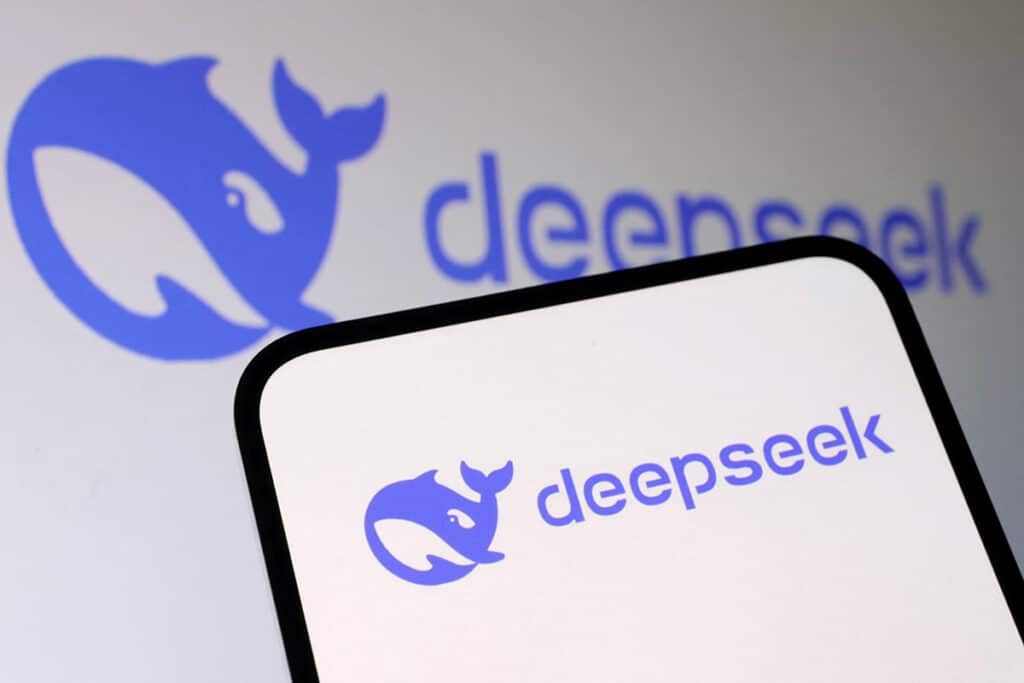The launch of Chinese AI startup DeepSeek has triggered what industry experts are calling a fundamental shift in the global technology landscape, presenting a direct challenge to long-held Western dominance in artificial intelligence development and sparking concerns about national security implications.
DeepSeek’s achievement in developing an AI model comparable to leading Western systems, at a fraction of the cost, has sent Western tech stocks tumbling and raised questions about the effectiveness of US export controls on advanced technology to China. The development comes amid growing tensions between the world’s two largest economies over technological supremacy.
“This is the start of Chinese AI spreading into the West,” Abishur Prakash, geopolitical strategist and founder of The Geopolitical Business Inc., told Arabian Business.
“We’re seeing now the tables are turning. Chinese AI is now entering Western societies and economies, and this is equal to what I call an AI invasion.”
The company’s reported development costs of just $6 million stand in stark contrast to the hundreds of millions or billions spent by Western competitors, potentially undermining the business models of established players like OpenAI and Google. This cost efficiency has particularly alarmed investors and policymakers, as it suggests China may have found a way to circumvent Western attempts to contain its technological advancement.
“It completely disrupts Western AI companies,” Prakash noted. “What incentive do Western consumers have to pay these companies $20 or $200 or more every month, if they can get the same thing from DeepSeek or anybody else from China for significantly less or potentially even free?”
The market reaction has been swift and severe. Nvidia, the leading supplier of AI chips, saw its market value drop by nearly $600 billion in a single day following DeepSeek’s announcement, marking the largest single-day loss of market value in history. The tech-heavy Nasdaq plunged by 3.1 per cent, while the broader S&P 500 fell 1.5 per cent.
The development comes at a critical juncture in US-China relations, coinciding with the US government’s announcement of the $500 billion Stargate initiative and renewed scrutiny of Chinese technology companies under the incoming Trump administration.
“The US needs two things,” Prakash explained. “First, the US needs to invest huge amounts of money to effectively stimulate the AI sector and attract more capital, attract more talent, and spur more innovations. And two, America needs a new kind of infrastructure for AI, which it doesn’t have.”
The breakthrough has challenged fundamental assumptions about China’s technological capabilities and the effectiveness of Western export controls.
“There was almost unshakable belief that America was the global AI leader by leaps and bounds,” he said. “Now DeepSeek matches and potentially exceeds some American AI models and was developed at a fraction of the cost. So this idea that the world knows what’s happening in China, from technology to military to social stability to economy – that’s gone. China returns to being a closed state.”
Export controls falter
Industry observers say the timing of DeepSeek’s emergence could prompt a reassessment of Western approaches to technological competition with China. The US government’s recent export controls on advanced semiconductors to China appear to have had limited effect in preventing such breakthroughs.
“This should be a wake-up call for the US and its allies that putting sanctions is not going to result in countries being frozen in time,” Prakash said. “The Western sanctions have not resulted in China slowing down, if anything, they’ve accelerated China’s sovereign projects.”
The impact extends beyond purely technological considerations. According to Prakash, DeepSeek’s ability to export systems with “Chinese beliefs, Chinese ideology, Chinese bias” raises new concerns about information control and censorship. Users have reported that the AI refuses to provide answers about sensitive topics such as the Tiananmen Square protests.

The situation has created a complex tension between consumer demand and national security concerns. “We’re now at an interesting point where you have the needs of consumers, who want cheaper models, cheaper platforms, better performance, versus the needs of the state, which are national security and economic security,” Prakash noted. “So which one overpowers the other?”
Market impact and investment outlook
Some suggest that DeepSeek’s success might indicate a broader shift in global technology development. The company’s ability to achieve significant advances with limited resources could signal a democratisation of AI technology, potentially making advanced AI capabilities accessible to a wider range of countries and organisations.
The implications for Western technology companies could be far-reaching. “The governments like the US government has been putting AI at the centre of the new American economic engine,” Prakash explained. “And now Chinese companies may be offering services that Western consumers use, and all of the bets and investments around US AI companies may begin to lose their effectiveness.”
While DeepSeek’s emergence has rattled markets, investment strategists suggest the long-term outlook for AI investment remains robust, despite immediate market concerns.
“AI remains a solid long-term investment theme, despite the recent market turmoil caused by disruptions like DeepSeek,” said Jacob Falkencrone, Chief Investment Strategist, Europe, at Saxo Bank. “The transformative potential of AI to reshape industries and drive innovation is unchanged.”

The immediate market reaction has indeed been severe. Nvidia’s historic $600 billion single-day market value loss has led to broader concerns about AI infrastructure spending and potential price wars. However, some analysts suggest DeepSeek’s cost-efficient approach might actually expand the overall AI market.
“Cheaper models like DeepSeek’s could democratise AI, opening doors for smaller players to innovate,” Falkencrone notes. “In short, the AI story isn’t over—it’s just evolving.”
This democratisation effect aligns with what economists call Jevons’ Paradox, where increased efficiency leads to higher overall usage rather than reduced consumption.
Investment strategists recommend that investors maintain a diversified approach to AI investments, particularly through ETFs that provide broad exposure across the AI ecosystem. This strategy could help manage risks in what appears to be an increasingly unpredictable technological landscape.









